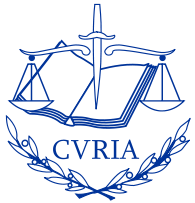| Its job is to decide on cases to do with EU law Based in Luxembourg Consists of three courts |
 |
![]() Court of Justice that deals with member states and EU groups
Court of Justice that deals with member states and EU groups![]() General Court that deals with business cases
General Court that deals with business cases![]() Civil Service Tribunal that deals with internal cases
Civil Service Tribunal that deals with internal cases
General
The Court of Justice is the highest court in the European Union in matters of EU law.
Its job is to interpret EU law and ensure it is applied across all member states.
EU law takes precedence over laws in the member states.
Note. The European Court of Justice is not to be confused with the European Court of Human Rights which is the court of the Council of Europe.
The Court of Justice: who does the work
The Court has 27 judges, one from each member state. They have the job for six years. Their appointment can be renewed for further periods of six years.
|
They are expert lawyers who come from top jobs in their own countries.
|
 |
| The President is Vassilios Skourisis from Greece who was first elected by fellow judges in 2003 for three years. The appointment has been renewed twice. |  |
In addition to the judges, the Court has 11 Advocates-General.
Six come from the large member states (Germany, France, UK, Italy, Spain and Poland). The other five come by rotation from the smaller member states.
Their job is give legal opinion on cases that raise new points of law. Judges take note of their opinions but are not bound to accept them.
The Court of Justice: how it works
The main job of the Court of Justice is to ![]() check that the groups of people who run the EU are acting within the law,
check that the groups of people who run the EU are acting within the law,![]() check that the member states meet their obligations under the EU Treaties,
check that the member states meet their obligations under the EU Treaties, ![]() explain EU law when asked to by the courts of justice of member states.
explain EU law when asked to by the courts of justice of member states.
It also deals with actions brought ![]() by a member state against the European Parliament
by a member state against the European Parliament ![]() by a member state against the Council of Ministers
by a member state against the Council of Ministers ![]() by one EU group against another
by one EU group against another
The Court of Justice hears cases in chambers of three, five or, for particularly important cases, as a Grand Chamber of 13 judges.
The Court examines a case in two phases: a written phase and an oral phase.
The written phase consists of a report that contains the pleadings from the parties who have brought the case and a statement about the law that applies.
The case is then heard orally in open court. The judges then consider the arguments and give their ruling also in open court.
The working language of the Court, including reports and judgments, is French. The applicant has the choice of language in which to plead.
In 2009 the Court had a budget of €238 million (£207 million). In 2008 the Court dealt with 1300 cases.
Recent noteworthy cases:
On December 6, 2012, the Court of Justice upheld a 53 million euro fine against the Anglo-Swedish pharmaceutical group, AstraZeneca, for policies aimed at delaying competition from generic drugs. The judgment was the first example of an abuse of dominance action in the drug industry brought by the EU competition authorities. Source: Financial Times of December 7, 2012
The General Court
Like the Court of Justice, the General Court has 27 judges, one from each member state. They have the job for six years. Their appointment can be renewed for further periods of six years.
It has no Advocates-General.
It meets in chambers of five, three and even one judge. Nearly all cases are heard by a chamber of three.
Its rulings may be appealed to the Court of Justice within two months of its verdict.
The General Court deals with
| trademarks in cases where they have been refused by the EU Trade Mark and Design registry | |
| competition rules | |
| company mergers |
| A recent example is the annulment of a decision of the Commission in relation to the proposed takeover by the Airtours company of a competitor. The reason for the annulment was because in the Court’s view the Commission had not shown enough evidence of the potential impact on competition. |
 |
The Civil Service Tribunal
The Civil Service Tribunal, which consists of seven judges, deals with disputes involving permanent officials working for the EU in its different groups.
Its rulings may be appealed to the General Court and exceptionally to the Court of Justice.
| For more detailed information click the Curia logo |
 |

